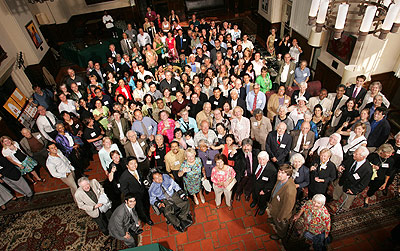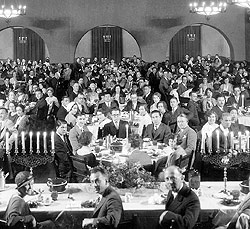Berkeleyan
 |
More than 200 alumni, friends, and current residents of International House celebrated the institution's 75th anniversary in June at a festive Sunday Supper, one of the oldest traditions to have evolved since the establishment of I-House in 1930.(Jim Block photo) |
I-House: 75 years old and going strong
Bringing residents together across cultural and economic divides
![]()
| 31 May 2006
In this age of niche broadcasting, it's too easy for people to tune into talk radio or TV's pundits to confirm what they already think, says Joseph Lurie, executive director of International House. "If you're always talking to someone who's like you or shares your same ideas, it's like running in a cul-de-sac," he explains. "You don't get anywhere."
Lurie contrasts that scenario with the one at I-House, where, living in a veritable United Nations, students are regularly exposed to ideas different from their own. Lively debates have been taking place in the multiracial, co-educational living center since 1930, and I-House has been busy marking its 75th anniversary with a number of fittingly international celebrations. To date, festivities have taken place in Berkeley, Melbourne, Taipei, Singapore, London, Milan, Paris, Los Angeles, and New York, with a Tokyo gathering scheduled next month.
I-House is in the home stretch of a $10 million fundraising campaign to raise money to shore up its infrastructure and to create disabled access in the Spanish-Moorish building. The campaign will also strengthen the coffers of a financial-aid program that helps students who otherwise couldn't afford I-House's fees. "If you think it's important for a Korean to meet someone from Argentina or a student from Nebraska to meet her counterpart from Bhutan, what about a student from an extremely wealthy background having an encounter with someone whose parents are perhaps peasants," asks Lurie. "That encounter between rich and poor is just as important in my mind as one between students of different ethnicities or religions."
 I-House diners, circa 1935, pause for the camera during the candlelight ceremony, a tradition continued today to close out Sunday Suppers. (Photo courtesy International House) |
In March, when the campaign's cash, pledges, and planned gifts totaled $8 million, the Kresge Foundation stepped in, issuing a $500,000 challenge grant that will be awarded only if I-House raises $1.5 million by December 2006. The grant "challenges the institution to strengthen and broaden our financial infrastructure," says Lurie, who explains the nonprofit organization has asked supporters to increase their gifts and solicited alumni who haven't previously contributed.
On May 9, I-House held a gala celebration - and fundraiser - at which Steven C. Rockefeller, co-chair of the multinational, interfaith Earth Charter Initiative (and grandson of International House benefactor John D. Rockefeller Jr.) gave the keynote address. In his speech, Rockefeller quoted from an essay by an Iranian student now living in I-House: "While the world around us is deprived of spaces which facilitate the formation of meaningful dialogue among different parties, and while the world around us is where discrimination and hatred reign, where 'big' politicians are busy with their war dances, here at I- House we learn to develop our 'own' politics, politics of 'peace' and 'friendship' through negotiation, cooperation, and empathy," wrote the student. Her sentiment supports Lurie's assertion that I-House is "more relevant today than it was in 1930," particularly in this time of political and religious polarization.
In 2002, after butting heads on their unsurprisingly divergent views, a Lebanese and an Israeli student started an I-House debate society, one that provided a forum last year when a Danish newspaper's publication of cartoons depicting the prophet Muhammad enraged Muslim fundamentalists. Danish and Muslim residents gathered together with other students from many countries to discuss the controversy, and though their perspectives differed, they came out of the experience with new knowledge, reports Lurie. I-House is no utopia, he says, but instead the multicultural community allows "people to encounter their differences and experience meeting someone who is their 'enemy' for the first time." Such encounters, he says, allow students from different backgrounds to discover their common humanity.

